'Before going to battle, Captain Anuj Nayyar gave me the engagement ring and photograph of his fiance.'
'I told him, "Why don't you keep it? It will motivate you to fight'.'
'He said he did not want the photograph to fall in the dirty hands of the enemy.
'I wondered why he was giving it to me. Did he feel he would not return?'

"Captain Anuj Nayyar was a young boy who had graduated from the academy two years back. I had promoted him from lieutenant to captain just 15 days ago in the war zone."
"I told him, 'Anuj, I have placed three stars on your shoulder and I want you to fulfil the responsibility. He said, 'Sir, I will not let you down, I will capture the objective given to us'," remembers retired Brigadier Umesh Singh Bawa, Commanding Officer, 17 Jat, during the Kargil War.
Last fortnight, Brigadier Bawa, who received a Vir Chakra for the capture of Point 4875, paid homage to his brave soldiers who made the supreme sacrifice at the Kargil Memorial in Drass.
"I could not bring back 36 of our boys to their families. I still carry that guilt with me after 24 years," the brigadier tells Rediff.com's Archana Masih in the concluding part of the interview.
- Part 1 of the Interview: What I Saw In The Kargil War...
The final assault of the battle for Point 4875 was the most difficult and your battalion lost many soldiers. Captain Anuj Nayyar's leadership and action will always be remembered in military history.
What were those final hours like?
At 8 am we saw the enemy preparing for a counterattack on Whaleback [a feature on that complex]. The company commander called to say that they were short of ammunition. I told them to hold on while we provided artillery fire support and some troops from the rear.
I sent young Captain Anuj Nayyar with 30 boys with extra ammunition. It took them 3 hours and they reached by 11 am.
The enemy tried another two counterattacks and we were able to beat them back. They suffered quite a lot of casualties. I too lost a lot of men and I salute them because they continued to hold that ground without vacating it.
Most of the attacks in the war were planned in the night -- when was your next attack? How did Captain Nayyar's leadership turn the tide?
My next attack with Charlie Company was on the night of July 6 (1999). The company commander was Major Ritesh Sharma and the leading platoon commander was Captain Anuj Nayyar.
The company commander Major Sharma with 5 other men was severely injured, so I asked them to fall back and hand over the charge of the company [about 120 men] to Captain Nayyar.
He was a young boy who had graduated out of the academy two years back. I had promoted him from lieutenant to captain just 15 days ago in the war zone.
I told him, 'Anuj, I have placed three stars on your shoulder and I want you to fulfil the responsibility. He said, sir, I will not let you down, I will capture the objective given to us'.
And he was recently engaged, wasn't he?
He was engaged to be married in September. Before going to battle, he gave me the engagement ring and photograph of his fiance.
I told him, 'Why don't you keep it? It will motivate you to fight.' He said he did not want the photograph to fall in the dirty hands of the enemy.
I wondered why he was giving it to me. Did he feel that he would not return?
These thoughts still go through my mind.

How did Captain Nayyar accomplish the task entrusted to him?
There were four bunkers [on the Whaleback feature] and he and his men captured three. He lobbed grenades, fired rocket launchers and led his men under heavy enemy artillery and mortar fire.
The fourth bunker was holding on and continued firing at them. It was 4 am on the morning of July 6 and Captain Anuj made his final attempt to capture the bunker.
Daylight had broken and he kept motivating his men under relentless enemy fire. He tried crawling towards the last bunker to throw a grenade and in doing so, was hit by an enemy rocket projectile.
I lost radio contact with him around 5 am. I sent another company commander with 30 men to check on them. I sent another radio set to replace Captain Anuj's radio set thinking it could have been destroyed.
The company reached around 9 and the company commander told me that he could see six motionless bodies near the fourth bunker. That was one of the worst news I have received in my entire life.
I cried to myself and could not show my grief to the troops.
How did the battle continue after that terrible loss of an officer and men?
I decided not to attack that bunker in the night, but in the morning.
My decision was unconventional because carrying out an attack in the day would expose us in full view of the enemy.
But I knew that the enemy would be expecting us in the night, so we kept pounding them with artillery and small arms fire. We did not allow them to sleep at night.
During the day the enemy was relaxed, secure in the thought that they will not be attacked because all our attacks used to be in the night. It is then that we launched a surprise attack from two sides.
It was 10 am and we attacked with 30 boys on each side as they rested on the reverse slopes.
The enemy left their weapons and ran -- by 1 pm we captured the objective and had the Tiranga flying on top of Point 4875.
I lost 1 officer, 1 Junior Commissioned Officer and 34 other ranks. About 100 soldiers had gunshot wounds and splinter injuries.
On site, we got unit citation by the army chief. We received battle honour Mushkoh, Theatre Honour Kargil and 1 Mahavir Chakra for Captain Anuj Nayyar, 4 Vir Chakras, 6 Sena Medals and 20 mentions in despatches.

You won the battle by paying a very heavy price. How was it for you as commanding officer who is like the father figure of the unit?
I saw dead bodies being brought down from the objective. There were soldiers with broken hands, legs and some were shot in the eyes. All the euphoria of winning was changed into a solemn affair.
I was very sad that I could not bring back 36 of our boys to their families. I still carry that guilt with me after 24 years.
These young men sacrificed their lives for the country.
Every year on Kargil Vijay Diwas, I feel it is not a day to celebrate but to pay homage to those who made the supreme sacrifice.
My wife and I met Captain Nayyar's parents and other soldiers who were recovering in hospital when I went to Delhi after the war.
I thanked the families for the sacrifice of their loved ones when we met for our Raising Day after the war.
Every soldier who wears a uniform wants to fight a war some day.
How many times have you been to the Kargil War Memorial in Drass?
I have been to Drass thrice. This time I took my wife and we saw the icy peaks together.
On July 8, we celebrate Battle Honour Day and pay homage to the brave men who were killed in action.
The Kargil experience is the foremost in my military career. I wrote a book Mashkoh As I Saw It as a tribute to those days.
Feature Presentation: Aslam Hunani/Rediff.com

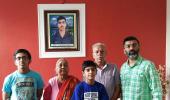
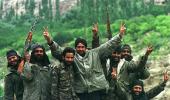
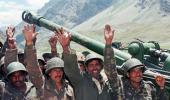
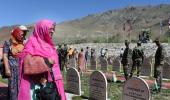




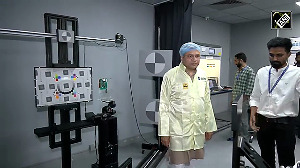
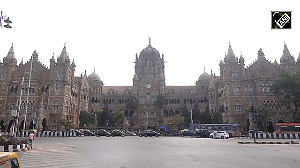
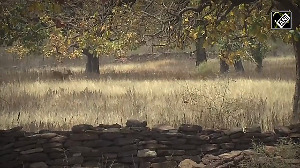
 © 2025
© 2025